Contact center of the Ukrainian Judiciary 044 207-35-46
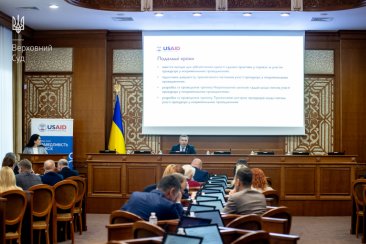
In 2016, amendments to the Constitution of Ukraine limited the functions of the Prosecutor's Office to the criminal justice sector. Since then, only in exceptional cases can prosecutors go to court in the interest of the state. Larysa Rohach, President of the Commercial Cassation Court of the Supreme Court, and judges of the Supreme Court discussed the impact of these restrictions in practice, problematic issues in cases of this category, and ways to resolve them during the presentation of the report on the results of the expert study "Supreme Court Case Law in Cases Involving Prosecutors in Non-Criminal Proceedings", conducted with the support of the USAID Justice for All Program.
Welcoming remarks were delivered by Borys Hulko, President of the Civil Cassation Court of the Supreme Court, Nataliia Petrova, Deputy Chief of Party of the USAID Justice for All Program, and Oksana Osadcha, Head of the Department for Representation of the State in Court of the Prosecutor General's Office. The event was moderated by Vitalii Urkevych, Secretary of the Grand Chamber of the Supreme Court (http://surl.li/fibdrn).
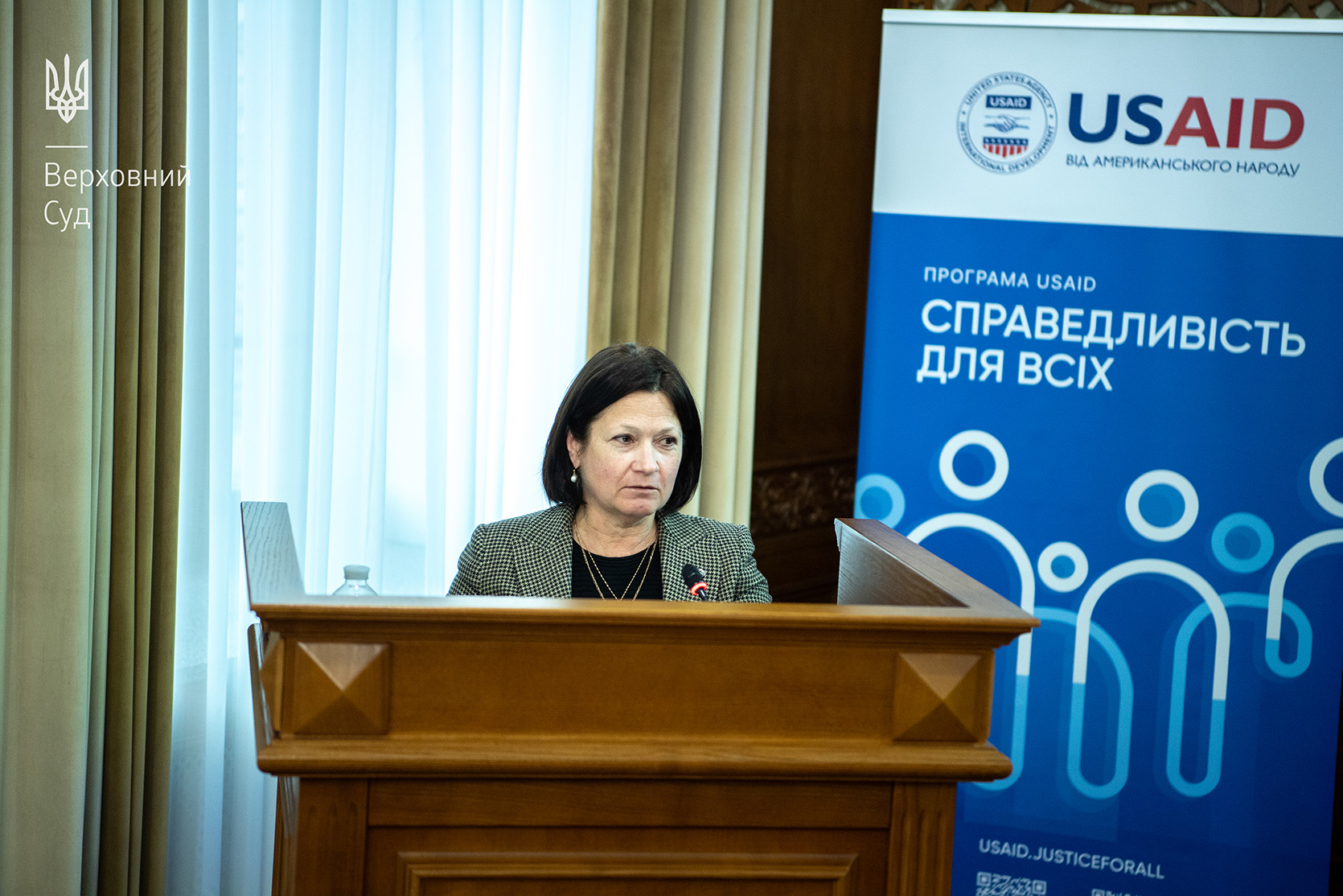
Judges of the Civil Cassation Court of the Supreme Court Nataliia Sakara and Vasyl Krat, Judge of the Administrative Cassation Court of the Supreme Court Volodymyr Kravchuk and Judge of the Commercial Cassation Court of the Supreme Court Vitalii Zuiev took part in the discussion.
Nataliia Sakara spoke about the categories of cases heard by the Civil Cassation Court within the Supreme Court. Most of them are cases arising from land relations. These are disputes over water and forest land, recognition of the right to land shares and condictional legal relations (when a person uses a plot of land without a specific legal basis and the prosecutor demands the recovery of the land use fee). Another category is disputes over compensation for damages caused by unlawful dismissal. The number of such cases before the Civil Cassation Court of the Supreme Court has recently increased. Cases concerning compensation for damage caused by a criminal offence are also considered at the request of the public prosecutor. In addition, the Civil Cassation Court of the Supreme Court has already begun to consider cases concerning the recognition of unjustified assets and the return of funds to the state.
The speaker noted that the greatest difficulty for the courts is the issue of determining the grounds for the prosecutor's involvement in the case. Prosecutors who go to court in the interest of the state do not always correctly determine the absence or inactivity of the relevant state body.
The judge referred to the decision of the Grand Chamber of the Supreme Court of 11 June 2024 in case No. 925/1133/18, in which it was concluded that the territorial bodies of the StateGeoCadastre may apply to the court in cases where this is expressly provided for in the relevant regulations (in particular, with claims for compensation for loss of agricultural and forestry production, restitution of illegally occupied or temporarily occupied land plots whose term of use has expired). And they do not have the authority to file a lawsuit to declare illegal and cancel the decision of a local government body to change the designated purpose of a land plot, the status of plaintiff in this case should be granted to the prosecutor (https://supreme.court.gov.ua/supreme/pres-centr/news/1646621/).
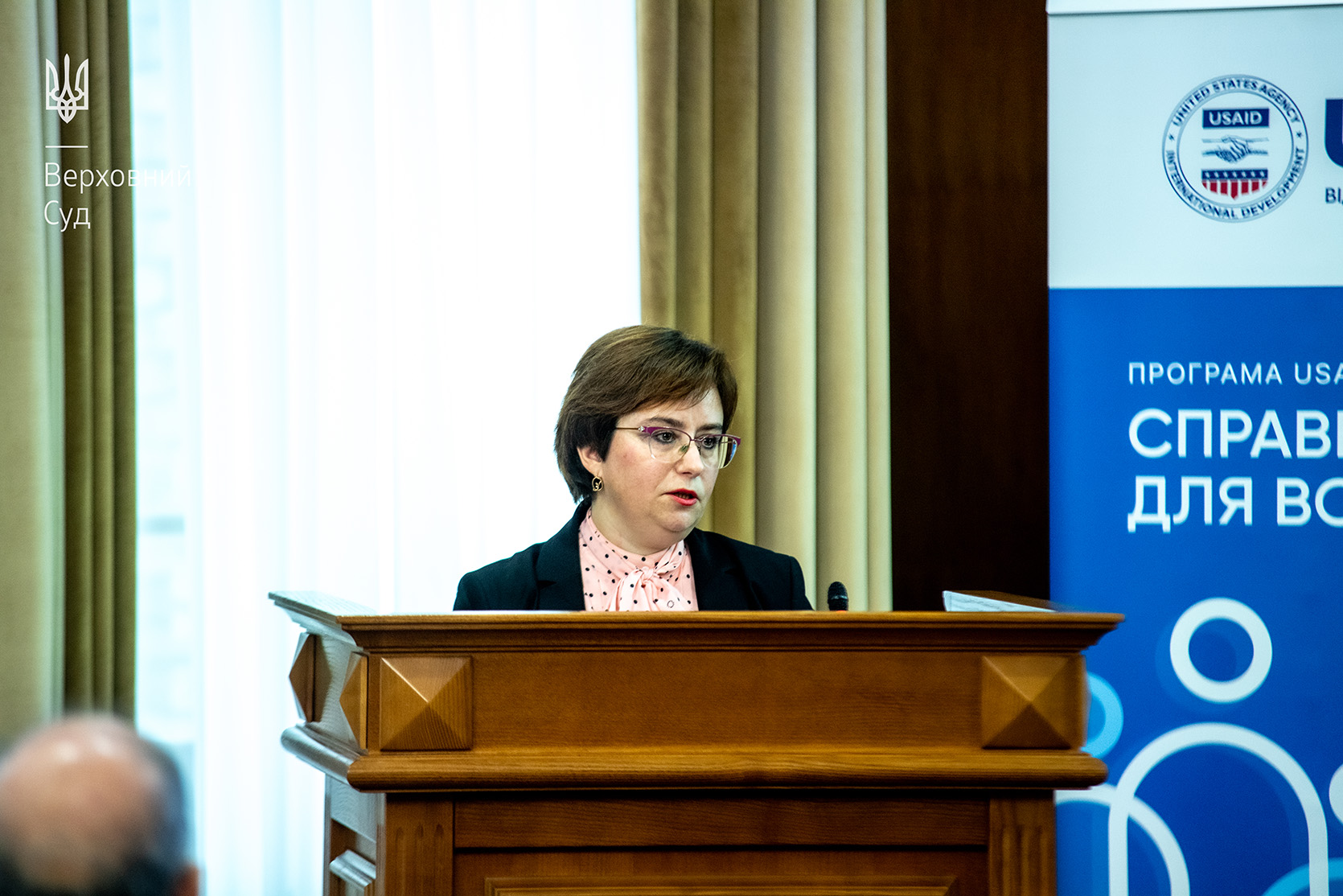
In this resolution, the Grand Chamber of the Supreme Court also formulated the general conclusions that:
1) the public prosecutor, in the interest of the State, represented by the body authorised by the State to perform the relevant functions, shall apply to the court, if:
- the body is a party to the disputed relations and does not itself violate the interests of the State, but another party (or participants) violates these interests;
- the body is not a party to the disputed relations, but is authorised (competent) to protect the interests of the State if the parties to the disputed relations violate the interests of the State.
2) the public prosecutor, as an independent plaintiff, shall apply to the court in the interests of the State if:
- there is no body authorised by the State to perform the relevant functions in the legal relations in dispute;
- the body authorised by the State to perform the relevant functions in the disputed legal relations is a party to the disputed legal relations and violates the interests of the State.
Nataliia Sakara also drew attention to the resolution of the Grand Chamber of the Supreme Court of 25 September 2024 in case No. 587/1382/15-ц, which concluded that until 15 July 2015, the Law of Ukraine ‘On the Prosecutor's Office’ allowed the prosecutor to represent the interests of the state represented by state-owned companies (enterprises) in court in case of violations or threats of violations of the state's interests (https://supreme.court.gov.ua/supreme/pres-centr/news/1689309/).
In addition, the speaker described the case referred by the panel of judges of the SC CivCC to the Joint Chamber of the SC CivCC (decision of the SC CivCC of 23 July 2024 in case no. 449/593/22). The court of first instance upheld the claim for recognition of the validity of a non-notarised land purchase agreement. The public prosecutor appealed against this decision. He argued that it harmed the interests of the state, represented by the State Tax Service of Ukraine, as the budget did not receive mandatory payments. The court of appeal dismissed the appeal on the grounds that the contested decision did not address the issue of the rights and obligations of the state. Therefore, the Joint Chamber of the CivCC of the Supreme Court must decide whether the prosecutor can represent the interests of the state in the relevant legal relations.
The judge noted that in such cases there may be abuse by the parties, who may initiate an artificial lawsuit to legitimise a tax-free sale and purchase agreement. Therefore, we can talk about the application of Article 228 of the Civil Code of Ukraine, which recognises the nullity of transactions that violate public order. On the other hand, the question arises whether in such a situation the prosecutor will not interfere with private interests.
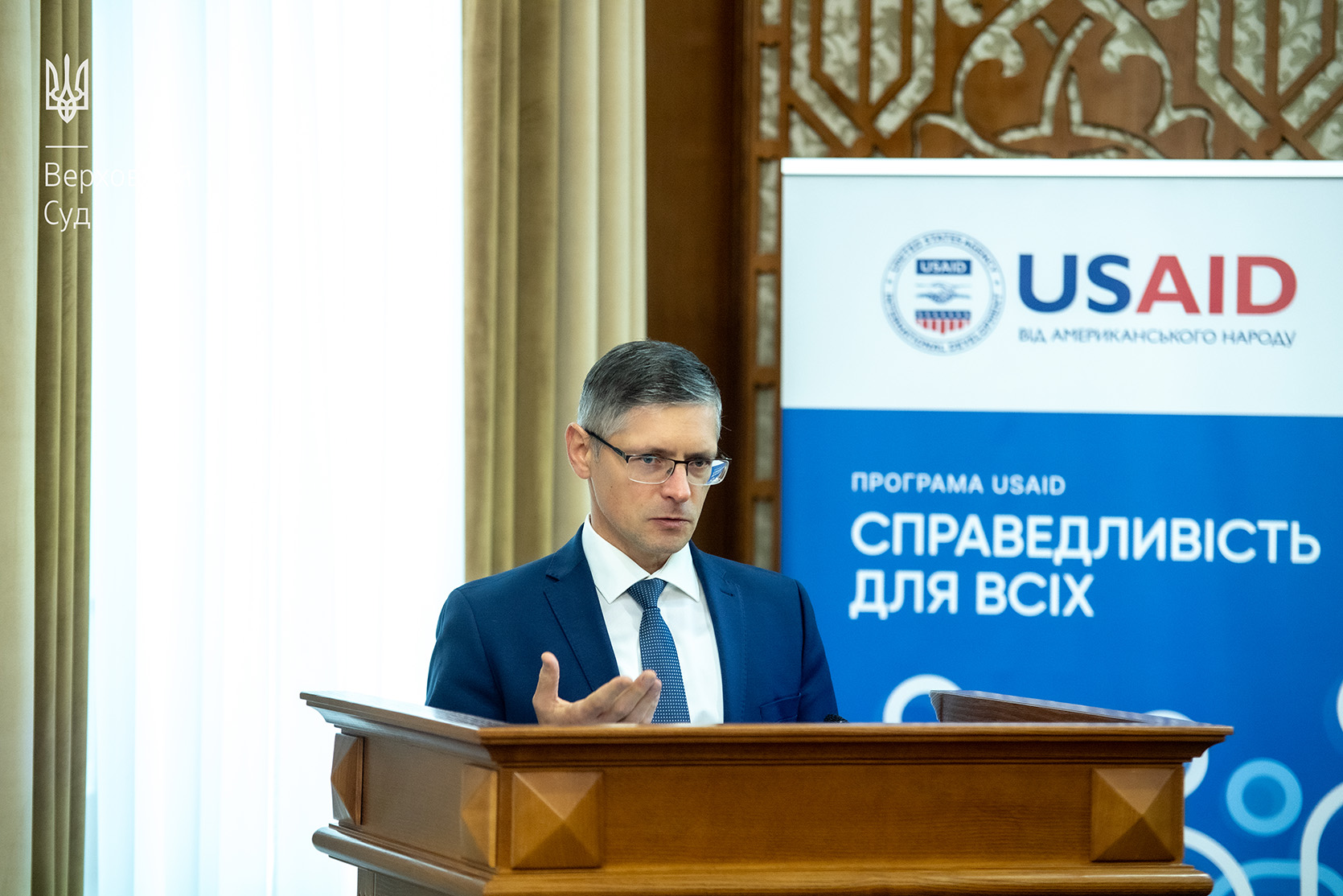
Volodymyr Kravchuk said that the Administrative Cassation Court of the Supreme Court considers many cases related to the protection of state interests. The judge noted that the biggest debate within the framework of the topic under discussion should be whether judges correctly understand the concept of the role of the modern prosecutor's office in the system of public authorities and, accordingly, reproduce it in practice. According to Article 131-1 of the Constitution of Ukraine, the prosecutor's office represents the interests of the state in court in exceptional cases, not as a general rule. However, statistics show a significant number of cases in which prosecutors are involved in non-criminal proceedings. Therefore, the general rule does not apply.
The importance of these cases cannot be denied: they are related to land issues, environmental protection, subsoil use permits, urban planning documentation, etc. These are all sensitive issues. However, while the prosecutor's office is entitled to represent the state's interests in court only in exceptional cases, this is generally a function of the executive branch.
The interests of the state should be represented and protected by the executive, not by the prosecutor or the court. The Cabinet of Ministers of Ukraine and central executive bodies operate on the principle of hierarchy and have many administrative tools, including the right to annul acts of subordinate bodies. However, prosecutors often do not appeal to these bodies but go directly to court. Therefore, according to the speaker, judicial practice should focus on the fact that it is primarily the executive authorities that should protect the interests of the state.
In addition, the judge noted that if the head of the relevant body does not see a violation of the state's interests where it actually occurs, does not want to protect these interests, then such inaction has signs of a crime (malpractice). Article 23 of the Law of Ukraine "On the Prosecutor's Office" stipulates that the prosecutor shall apply to court in case of violation or threat of violation of the state's interests, if the protection of these interests is not carried out or is carried out improperly by a state authority, local self-government body or other subject of power. In such a case, the application to the court shall be accompanied by a criminal-law assessment of the actions of the head of the relevant body. The court should ask the prosecutor what he or she did to ensure that the interests of the state were protected by the competent authority.
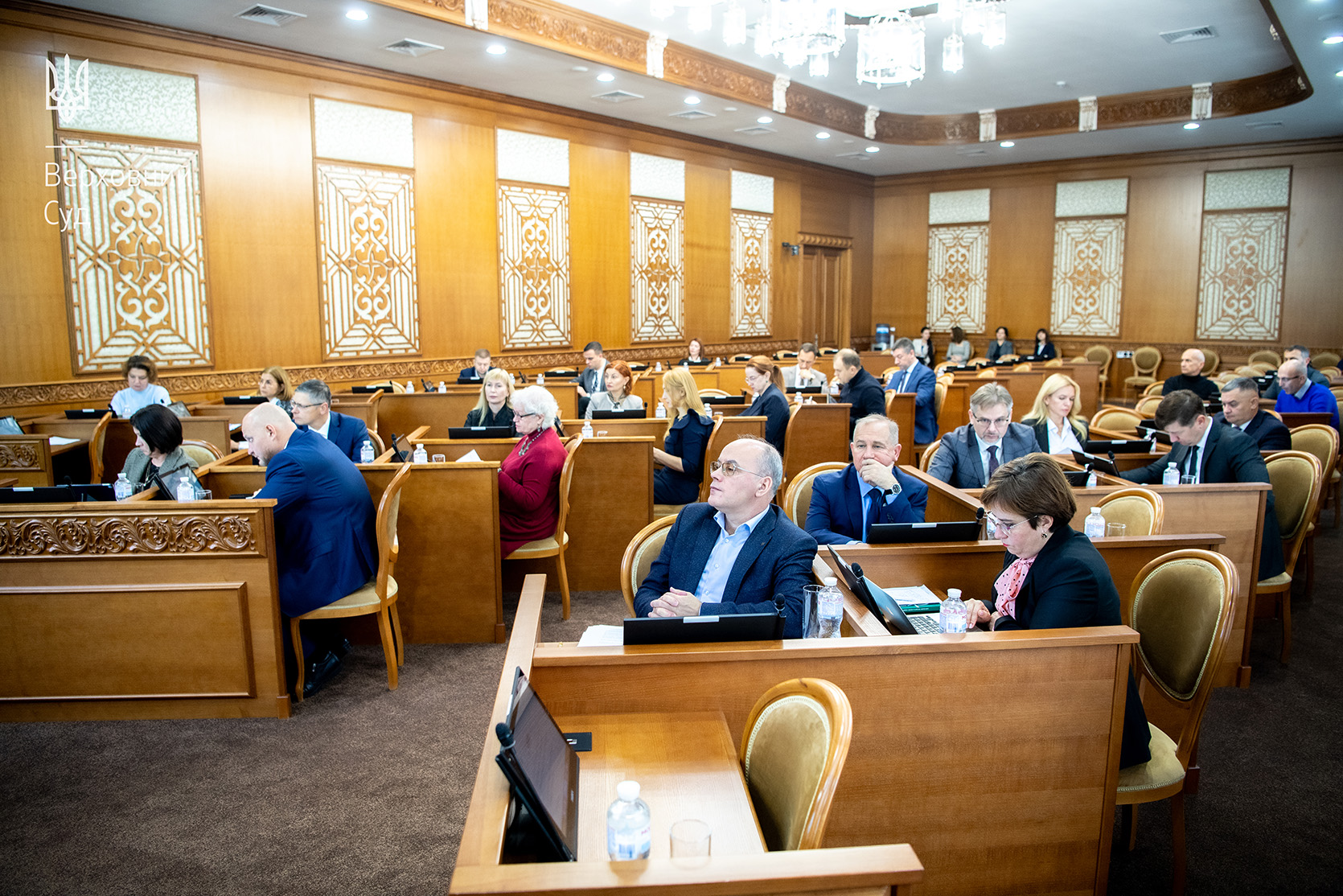
Judicial practice should be guided by the fact that, when applying to the court, the prosecutor must prove the exceptional nature of the case: that he or she has not only identified the inaction of the state body, but has also established its causes and reacted to them, if the elements of a criminal offence have been established. In addition, the prosecutor can raise questions about the inaction of a particular body with a higher authority, rather than going directly to court.
Volodymyr Kravchuk outlined the issues that could be the subject of further research, including the vagueness of the concept of 'state interests'. There is also the question of how the interests of the state relate to the interests of certain social groups (children, pensioners, people with disabilities, etc.). Can a violation of the rights of a social group be considered a violation of the state's interests? In addition, administrative courts face the problem of determining the timeframe within which a prosecutor may file a complaint with the court. Article 122 of the Code of Administrative Proceedings of Ukraine contains a special provision according to which the time limit for a public authority to apply to court is calculated from the date of occurrence of the grounds entitling it to apply to court, and not from the date when it learned or should have learned of the violation of the state's interests. If we assume that the prosecutor is a public authority (which is also questionable) and interpret this provision literally, the prosecutor can go to court in relation to relations regardless of their statute of limitations, which undermines legal stability.
Vitalii Zuiev agreed with the view that the prosecutor's representation is gradually expanding, in fact returning to general supervision. There should be no situations when the prosecutor states in a statement of claim that he or she has discovered a violation committed 10 years ago as a result of analysing citizens' appeals or information in the media. While the interests of the state are undoubtedly important, Article 1 of Protocol 1 to the Convention for the Protection of Human Rights and Fundamental Freedoms, which guarantees the right to peaceful enjoyment of one's possessions, is also of great importance for commercial jurisdiction. In addition, speaking about the nullity of transactions made long ago, the judge stressed that there are also limitation periods for applying the consequences of nullity.
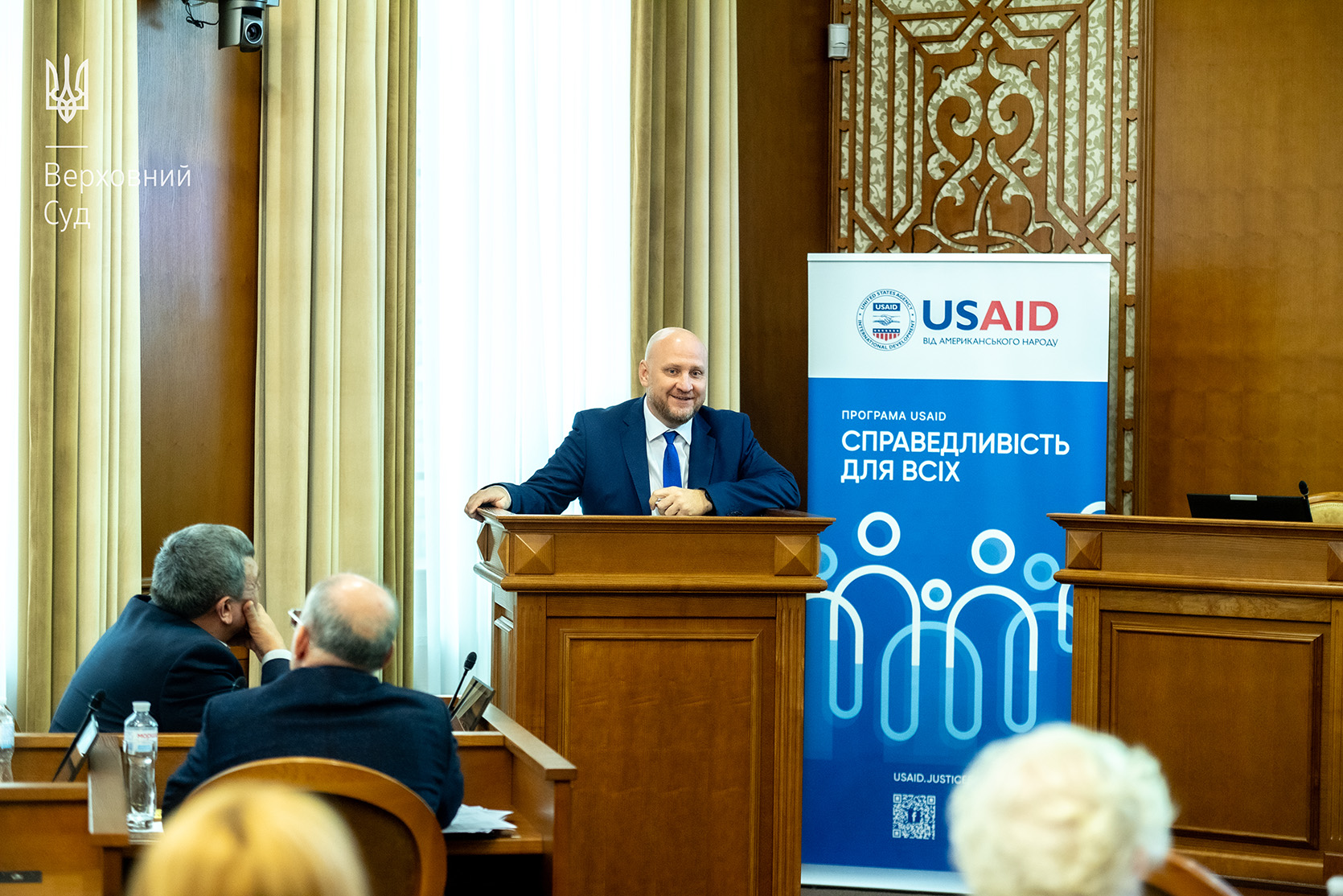
Vitalii Zuiev also drew attention to one of the cases he was handling as an example of an attempt to widen the scope of the prosecutor's powers. The prosecutor asked the court to order the company to comply with the clause of the environmental protection programme under which the regional council required the company to invest in the modernisation of its environmental systems. The panel of judges of the Commercial Cassation Court of the Supreme Court found that the prosecutor was attempting to transfer the procedure for exercising the administrative powers of state and local authorities to the sphere of private law relations by creating an artificial structure of a dispute over the fulfilment of an obligation. On the basis of the local environmental programme, the subjects of environmental legal relations are obliged to implement it, and the failure to do so entails the commencement of liability under the relevant legislation, and not the emergence of a binding legal relationship, as the prosecutor wrongly stated (the resolution of the CommCC of the Supreme Court of 16 November 2022, case No. 904/6264/21).
In addition, the speaker noted that in the relevant non-criminal proceedings, prosecutors are mainly trying to deal with the consequences of improper performance or non-performance of duties by the competent state authorities. And if there is no proper response from prosecutors, the situation will not change dramatically. In practice, many contracts are invalidated by the prosecutor's demands, but no one is held accountable.
Vitalii Zuiev also drew attention to the problem that arises when a prosecutor goes to court on behalf of one state body with a claim against another state body, and in fact a claim is made by the state against the state.
Larysa Rohach, President of the Commercial Cassation Court of the Supreme Court, emphasised the need to continue cooperation in the field of expert research and analysis of the Supreme Court's jurisprudence, taking into account statistical data on the number and subject matter of prosecutors' claims in non-criminal proceedings. She also stressed the importance of maintaining a balance of interests when considering cases in this category, taking into account respect for the right to property guaranteed by the Convention for the Protection of Human Rights and Fundamental Freedoms.
The President of the CommCC of the SC stated that she had great respect for all state institutions representing the state. At the same time, she noted that the exceptional case of the prosecutor's representation of the state's interests in court cannot become a general rule, as it may give the impression of the inefficiency of the existing public administration.
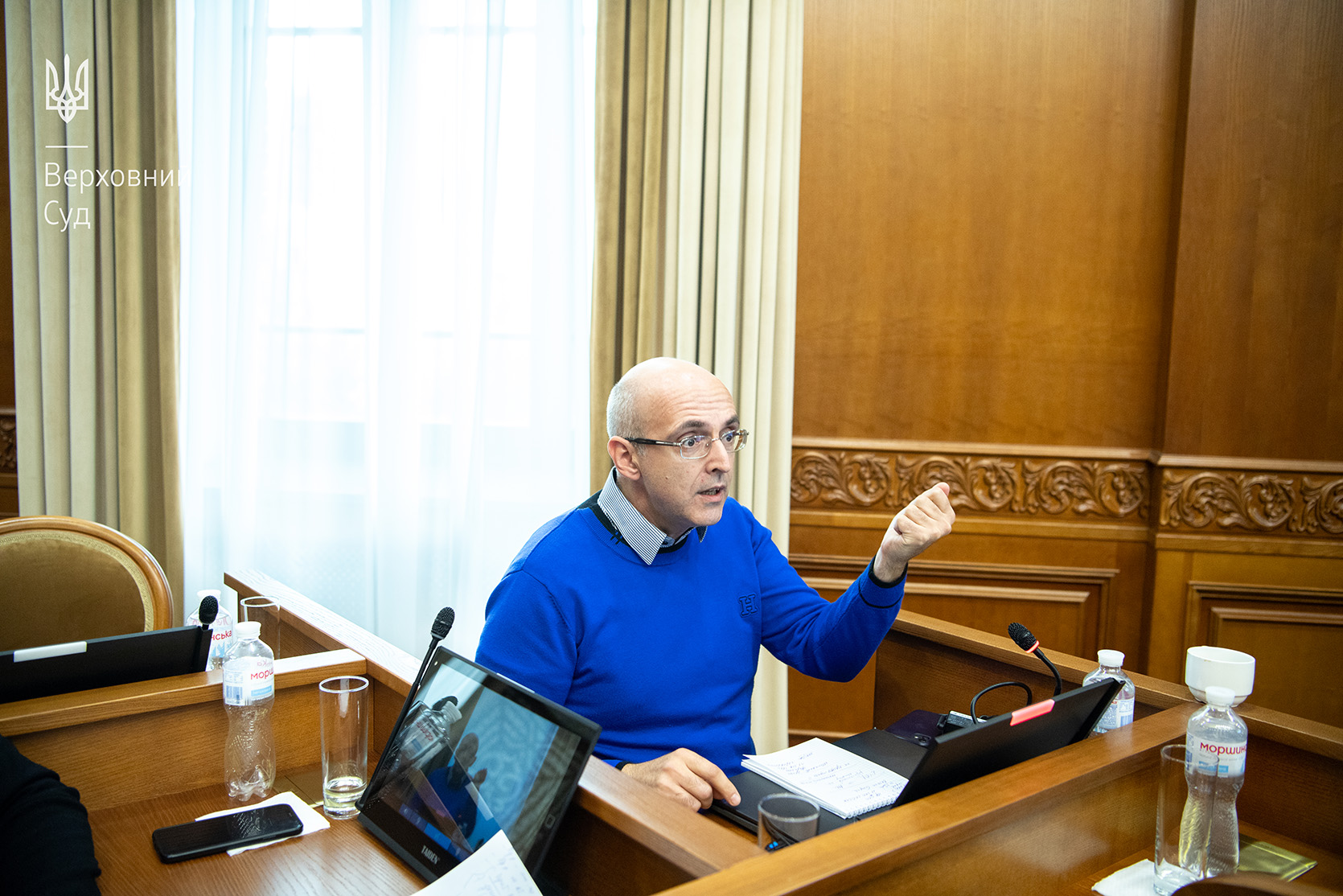
Vasyl Krat drew attention to the issue of the prosecutor's representation of the state's interests in court in the current reality: whether it is still subsidiarity or, as before, general supervision. Everyone agrees that the current situation is more like general supervision. Is this in accordance with the Constitution and the law? According to the judge, this question is rhetorical.
In addition, the speaker noted that prosecutors use different forms of participation in court proceedings. After all, the European Court of Human Rights often recognises that court decisions in such cases violate the right to peaceful enjoyment of property. Vasyl Krat pointed out that the ECHR is currently considering some 200 cases of property recovery, including those initiated by prosecutors representing the state, 80 of which were filed last year.
The judge also drew attention to the judgment in the case of Shmakova v. Ukraine (11 January 2024, application no. 70445/13), in which the ECHR found a violation of Article 1 of Protocol No. 1 to the Convention and ordered the state to pay the applicant 11,000 euros. In this case, the city council transferred a plot of land free of charge to the applicant, who received a certificate of ownership from the State and built a house on it. However, the prosecutor, acting on behalf of the state, brought an action against the city council, seeking the annulment of the city council's decision to transfer the land to the applicant. The national courts ruled in favour of the prosecutor.
Vasyl Krat pointed out that the disputed land did not belong to the water or forest fund, there were no historical monuments on it, etc. Instead, the state must now pay the plaintiff 11,000 euros. And the number of such cases in the ECHR is growing.
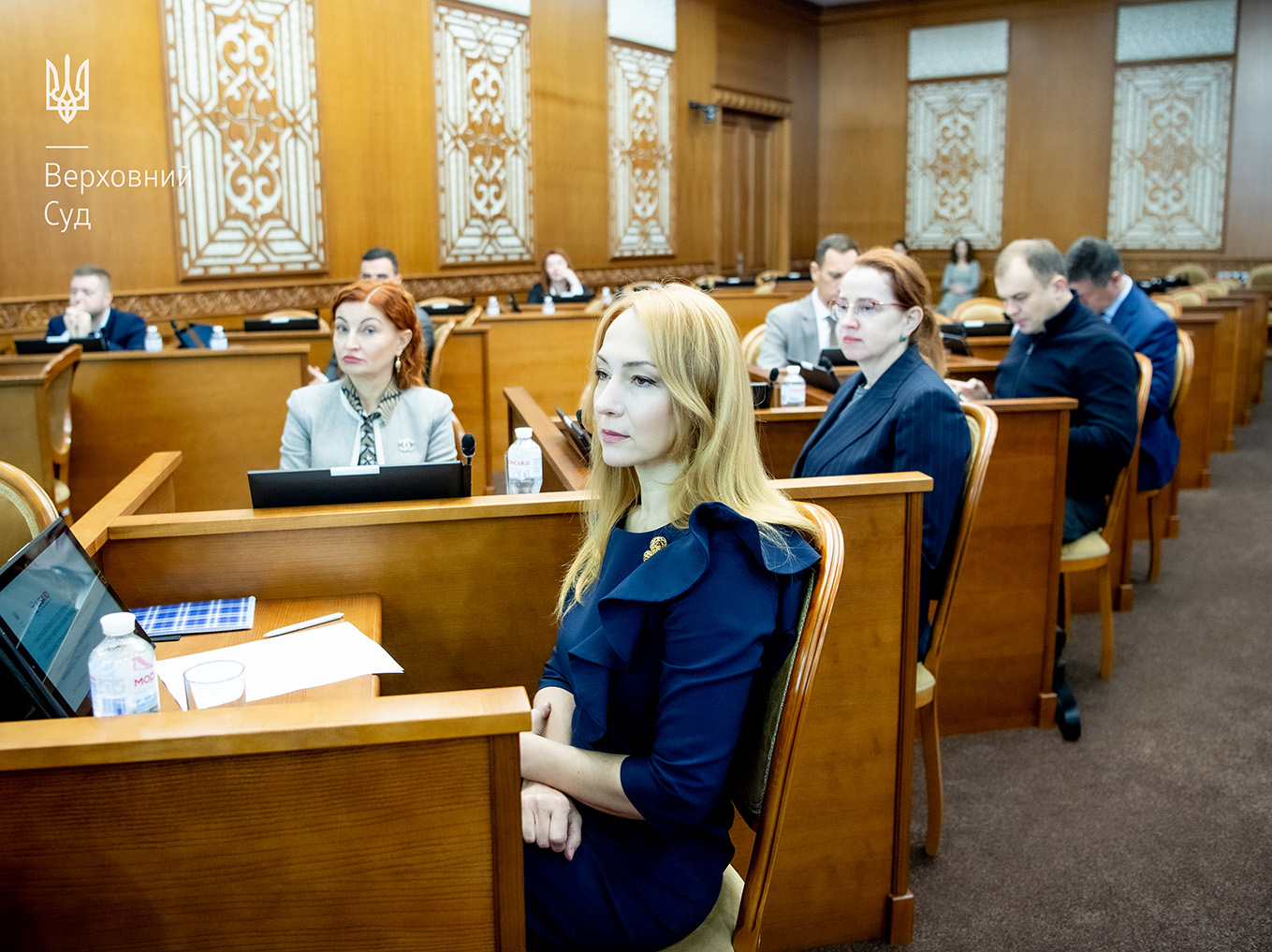
Another problem, according to the judge, is the sometimes excessive procedural activity of prosecutors. For example, a request to the cassation court to correct a typographical error concerning an amount that differs by UAH 1. To do this, the cassation court has to request the case from the court of first instance, ensure that the case is considered, and so on. This will cost the state much more than the price of the misprint. In general, in both substantive and procedural law, we do not pay enough attention (one might say none at all) to economic analysis in the application of the law. Yet such analysis is essential.
The event was also attended by the Secretary of the Supreme Court Plenum, Secretary of the First Judicial Chamber of the Civil Cassation Court of the Supreme Court Dmytro Luspenyk, Judge of the Grand Chamber of the Supreme Court Serhii Martiev, Judges of the Administrative Cassation Court of the Supreme Court Zhanna Melnyk-Tomenko, Nataliia Kovalenko, Semen Stetsenko, Tetiana Strelets, Yan Bernaziuk, Serhii Ukhanenko, Nataliia Martyniuk, Judges of the Administrative Cassation Court of the Supreme Court Yevhen Synelnykov, Vladyslav Shipovych, Andrii Hrushytskyi, Yevhen Petrov, Iryna Lytvynenko, Vadym Ihnatenko.
The participants of the event stressed the need to continue cooperation with the USAID Justice for All Program to conduct an in-depth analysis of this topic and an expert study of the Supreme Court's case law, taking into account statistical data on the number and subject matter of prosecutors' claims in non-criminal proceedings and the timing of appeals to the court.
In order to improve law enforcement in this category of proceedings, it is also important to work on legislative changes that should ensure procedural equality of all participants in non-criminal proceedings and compliance with the principle of legal certainty as a guarantee of a fair trial.
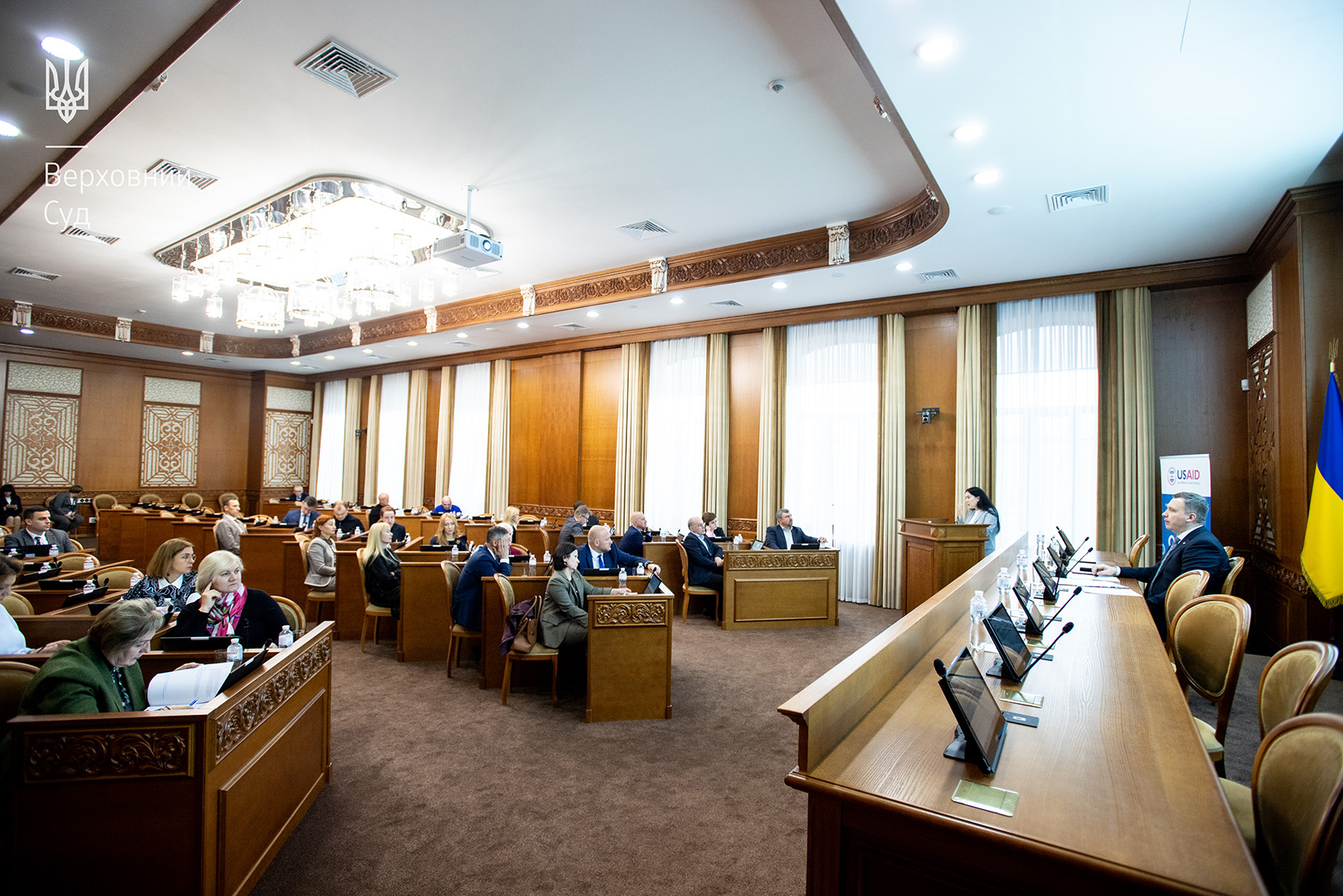
For reference. The author of the expert study is Tetiana Tsuvina, Doctor of Science (Law), an expert with USAID's Justice for All Program.
The purpose of the study was to analyse the jurisprudence of the Supreme Court in cases involving a public prosecutor in civil, commercial and administrative proceedings, taking into account the standards for ensuring the right to a fair trial under Article 6(1) of the Convention for the Protection of Human Rights and Fundamental Freedoms and the jurisprudence of the ECHR, and to identify common approaches and cases of lack of uniformity in the decisions of the cassation courts within the Supreme Court, in particular the CivCC of the Supreme Court, the CommCC of the Supreme Court and the ACC of the Supreme Court, in this category of cases.